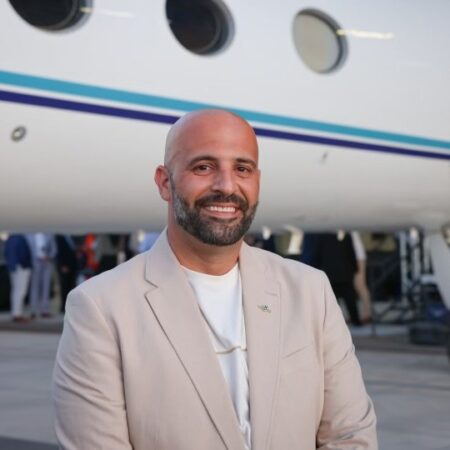Mark J. Carmen, president and CEO of Modern Aviation discusses his journey from investment banking to founding a rapidly growing FBO network.
Can you share your journey into the industry?
I was an investment banker for more than 16 years, mostly for Jefferies and with a focus on the aerospace, defense and government services industry. After that, I spent a couple years in private equity at Macquarie, where I led the acquisition of Sentient Flight Group. My operating experience was gained as president of Universal Weather and Aviation, at the time a global business aviation services company involved in international trip support services, global contract fuel and FBO services in over 20 countries around the world. After I left Universal Weather & Aviation, I remained as a board member for a couple years and in 2015, I represented the company in the sale of its only USA-based FBOs in Hawaii. It was the combination of all these experiences that gave me the knowledge and confidence to ultimately start Modern Aviation. Emmanuel Yapo, my co-founder, and I began discussing our plans for starting a FBO business in 2016.
Can you tell me about Modern Aviation?
We founded Modern Aviation in February 2018 with our first acquisition in Wilmington, North Carolina.
Our goal was to challenge the status quo in the FBO industry by providing world-class customer service with a strong focus on safety. Our corporate team is largely virtual so we could attract top talent without making them move to wherever we chose to headquarter the company. Our corporate team’s jobs are to help support our team members at our FBO locations and to make them even more successful, so we meet at our locations, which is where we need to be. As a result, I believe we’ve attracted better talent. Our network currently includes 18 locations in the United States and Puerto Rico, and we are continuing to grow. Our locations range from Seattle to San Juan and Westhampton to Fort Worth.
How has your leadership approach evolved throughout your career?
My leadership approach has changed significantly over my career and even in the past seven years since we started Modern Aviation. During the first few years of Modern’s history, I was mostly focused on identifying and closing acquisitions to get the business started. As a result, I was executing acquisitions, relying primarily on my investment banking and private equity skills and experience. However, once we closed our first few acquisitions, we were an operating business, and I had to also focus on operations and developing a culture that would differentiate Modern in the industry and attract the best and brightest to the company.
We had to establish processes so that we could provide world-class customer service and operate safely. I also had to begin building a top tier management team to execute our strategy. My leadership approach can be defined as a human-centric leadership model. Since our people provide our services and interact with our customers every day, we need to create and sustain a culture that guides team members’ behaviors and empowers them to act. We believe we have a great culture at Modern that attracts the right employees and enables us to differentiate what we do and how we do it.
What are the key responsibilities of your role at Modern Aviation?
As the CEO it is my responsibility to set the company’s strategy and make sure we have the team in place to execute. I consider myself our chief culture officer and am very focused on ensuring that we maintain our culture, which has created much of our success, as we continue to grow. Our front-line team members are providing services to our customers 24/7/365 and my job is to make sure they have the tools, training, resources, information and the values to operate safely and wow our customers. And to have fun, most of the time, while they are doing it.
What are some of the biggest challenges currently facing the private aviation sector?
The industry is working to address the environmental challenges it faces through electrification of ground service equipment and sustainable aviation fuel. Extreme weather events have created more uncertainty and increased property insurance costs for the FBO industry. Another challenge facing operators is that there aren’t enough pilots and experienced maintenance personnel, so it is difficult to hire in these areas.
What has been your most significant achievement during your time at Modern Aviation?
I think the fact that we’ve grown the company to 18 locations with over 500 employees from a business plan seven years ago is a big achievement. But the most important accomplishment is creating a company that is known for being a great place to work due to its strong team
member-oriented culture. We try to have fun, and we get to work with great people who we chose to work with.
Finally, we’ve seen individuals at Modern grow their careers being smart, working hard, caring about their colleagues and communities, our customers and the company, and always trying to do the right thing when making decisions. When you work for a high growth company, there’s always more to do than there are people to do it.
I’ve been impressed that so many of our people just raised their hands to do more and they have learned more, contributed more and been promoted. Personal growth and career growth are big parts of our culture. This is what makes me most proud.
How does Modern Aviation stand out in the competitive landscape of private aviation?
Modern Aviation is more than just an aggregator of FBO locations. We have worked to build a brand and a culture that are unique among fast growing FBO portfolios. We are more than an FBO offering fuel services and hangar space. We invest in safety by registering all our locations with the International Standard for Business Aircraft Handling (IS-BAH) for its independent safety certification. We believe in creating a culture that fosters a positive working environment for our team members which empowers them to deliver on our mission: to provide our customers with the best experience, every visit.
What emerging trends in the aviation industry do you think will have the most impact?
I think eVTOLs represent an exciting opportunity for the aviation industry to grow its customer base. Semi-private charter companies could be another avenue for growth if they are able to grow their networks and appeal to more customers. Technology could help charter companies and other operators increase efficiencies by reducing dead legs and other costs, which could bring charter costs and pricing down to appeal to a broader customer group. Sustainability is another factor that will impact the industry.
How do you anticipate business aviation changing in the next decade?
Aircraft are getting larger and several new models have been developed and in production or certification. There is demand for larger cabin aircraft with longer ranges. We are already seeing this today, which means there will be increased demand for hangar space. We will see a heavy focus on sustainability in the aviation industry and the electrification of everything from ground service equipment to aircraft.
This will create the need to get more electricity to the airports for charging stations and electricity storage. We will see a focus on the use of advance technology like AI to create efficiencies in flight management and operations, as well as to improve safety.
How is Modern Aviation addressing the growing demand for sustainability in the aviation sector?
We are electrifying our fleet of ground service equipment and taking other actions to reduce our carbon footprint. We are installing LED lighting throughout our campuses to reduce our use of electricity and have put into service the second electric fuel truck in our industry at our Seattle FBO. Sustainable aviation fuel is available in limited supplies in certain markets where there is refining capacity, but it is still at a significantly higher cost than Jet A fuel. In time, with additional supply, the cost will come down and it will be available more broadly. Modern also uses sustainable materials and methods in its construction projects to limit the environmental impact.
What has been the most valuable lesson you’ve learned throughout your career in aviation?
While the business aviation industry is very large, from a people perspective it’s very small. It is a relationship oriented sector and there are just a few degrees of separation between people. As a result, there is nowhere to hide in our industry, so we need to take a long-term view on how we run the business and how we treat team members, customers, vendors and airports. I believe in transparency with all constituents. We say what we will do and do what we said. We set expectations and meet or exceed them. And we always look for win-win relationships.
Modern Aviation has expanded significantly in recent years. Where do you see the company in the next five years?
We intend to continue to grow the business through acquisitions, building more hangars at our existing locations and responding to airport RFPs (request for proposals). We will focus on adding new FBOs we believe are strategically important and add value to our network, enabling us to better serve our customers.
What advice would you give to someone interested in starting a career in business aviation?
I’d suggest they be open and flexible to new opportunities as the industry is growing and always changing. Most important is to get a foothold in the industry and then network and build relationships.





